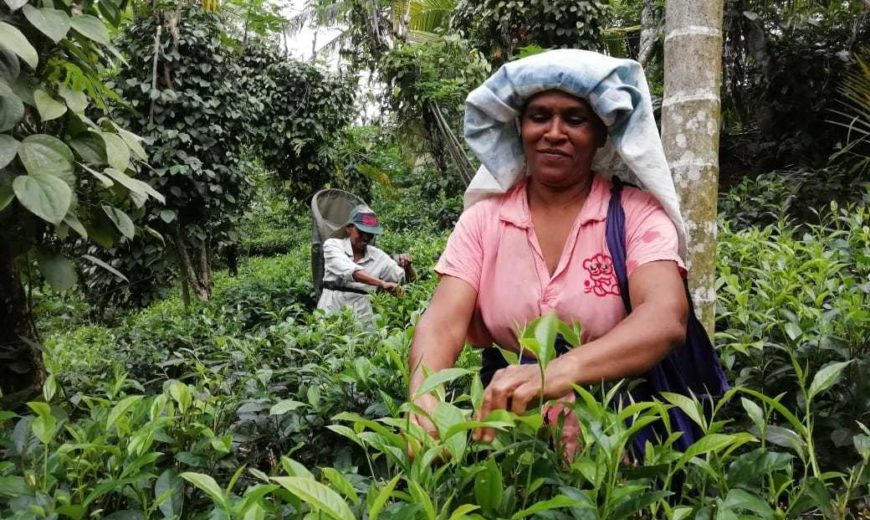Fairtrade producer organisations in 55 countries are benefitting from the €2.1 million Fairtrade Producer Relief Fund that is helping thousands of farmers, workers and their communities cope with the immediate impact of the COVID-19 crisis.
Following the outbreak in Wuhan, the first cases of COVID-19 were confirmed in February in both Africa and South America. Fairtrade International responded in March by mobilising member organisations and partners to donate to the Fairtrade Producer Relief fund. By early May the money was already being disbursed and used for urgently needed investment in safety and livelihoods.
Since then, farming communities have continued to show incredible resilience and determination by finding new ways of working to ensure safe working environments and business continuity. Across Africa, Asia-Pacific, and the Americas key efforts include:
- Distribution of Personal Protection Equipment (PPE) and basic food necessities throughout the producer networks
- Testing, hygiene and prevention education to limit the spread of the virus
- Awareness programs to help employees be mentally prepared for outbreaks, playing a key role in managing fear and mental health
- Safeguarding resources to meet increased production costs
- Temporary payment of wages for suspended workers in some regions
Fairtrade International reached out to our three producer networks to find out what receiving this support means for those on the frontline of the pandemic. Here’s what they said:
Receiving nearly €200,000, Fairtrade Africa (FTA) reports flower producers as the largest recipient of FTA’S total relief funds provided for the region to date, that amount to about €668,000. Cocoa (€161,000), coffee (€161,400) and tea (€63,500) producers followed as the next largest beneficiaries. FTA reports they have disbursed funds to 245 producer organisations and highlight just a few of the many ways the funds are being used:
- The Asunafo North Farmers Union Co-op in Ghana provided funds for radio programs broadcasting messaging on how to prevent the spread of the virus which reached its 8,108 members spread across 67 communities.
- At the Machakos Coffee Co-operative Unionin Kenya, 81 member associations consisting of 60,000 farmers were supplied with face masks and hand washing facilities.
- Kayonza Tea Growersin Uganda conducted health education training and provided Personal Protective Equipment for 4,556 estate workers, covered temporary payment of wages for suspended workers, and implemented local food security initiatives.
- ABOCFA producer organisation in Ghana, with 900 members, supplied soap, hand sanitisers, and face masks, as well as food items such as rice, oil, canned fish, and canned tomatoes.
Find more stories from Fairtrade producers in Africa
Producer organisations in Fairtrade’s Caribbean, Latin and Central America producer network (CLAC) have spent 70% of €460,000 in relief aid covering 177 co-ops.
It’s estimated the funds have so far helped nearly 73,000 people in the region. Thirty-seven-percent of the funds were used for the provision of biosafety materials.
- The APBOSMAN banana co-operative in Peru conducted rapid tests on an initial group of 44 workers and paid for the purchase of additional COVID-19 tests plus eight thermometers to monitor the temperature of the workers in the processing plant.
- The Cooperativa Central Cacao Aroma de Tocache in Peru used the funds to cover increased costs for commercialisation and transportation of cocoa from local warehouses in the co-operatives to the main warehouse.
- In Nicaragua, the Cooperativa La Esmeralda initiated an informational poster campaign just in time as the pandemic starting affecting the country. It also provided 233 associates, workers and their families with cleaning and disinfection kits.
Find more stories about how producers from CLAC are coping with the impact of COVID-19.
Within the Network of Asia and Pacific Producers (NAPP) the majority of the allocated €761,000 was disbursed to tea and coffee producers (€192,000 and €161,000 respectively) followed by herbs and spices, rice and fresh fruits producers. More than 262,000 people benefitted from this assistance. NAPP shared just a few of the many efforts, which reached producers in even the smallest of villages.
- The Arinagata Co-operative coffee producer in Indonesia initiated a cash transfer of roughly €230 to each producer and co-op staff member, to help cover lack of income. In total, 101 members and their families benefitted from this support.
- Talon Sports PVT LTD in Pakistan, producing sports balls and garments, established a hand washing/sanitising station at every entry gate, provided masks for their workers, and created awareness on COVID-19 preventative measures as well as training on social distancing directly benefitting 350 people.
- The Karmatera Co-operative in Indonesia used the fund to enhance food security for coconut sugar producers. First, it delivered food relief to 360 co-op and community members in 11 villages. Each member received a package containing rice, eggs, vegetables noodles, cooking oil and milk. The co-op then distributed vegetable seeds and polybags to 500 farmers in central Java to help strengthen local food supplies. It also reduces the need for farmers to shop at local markets, potentially reducing the exposure to the virus.
Find more personal experiences from Asia Pacific producers
Given the unprecedented nature of the pandemic and its evolving impact, Fairtrade continues to mobilise resources to meet the growing health and economic needs of producers affected across the globe. With an additional investment of €1,000,000 from Fairtrade organisations, Fairtrade International has also established the Fairtrade Producer Resilience Fund to support producers’ longer-term economic recovery. ‘We welcome partners interested in supporting producers who are going to be further marginalised by the economic impact of the pandemic in the months to come,’ says Dario Soto Abril, CEO of Fairtrade International. ‘We will continue to reach out to retailers, businesses, non-governmental and governmental agencies to grow the Fairtrade Resilience Fund during this pressing time. As farmers and workers face uncertainties due to the pandemic, we remain committed to ensuring they are able to secure their livelihoods while building resilience in supply chains.’
